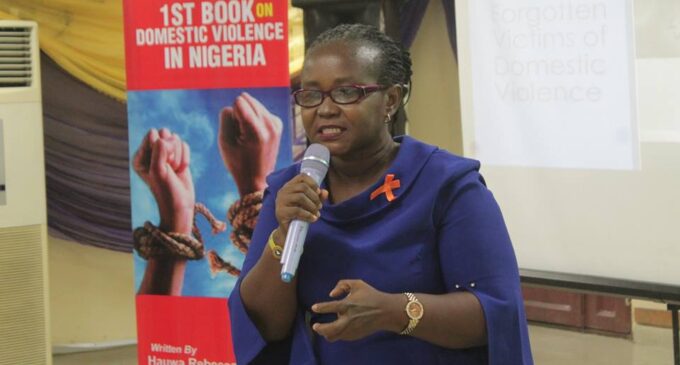Nigerian children deprived of their childhood, says consultant

Early childhood education refers to the period of education between birth and the first eight years of life. According to UNICEF, play and stimulation in these years can and has contributed to “breaking the cycle of poverty.
It also offers an entry point and platform for improving social equity and inclusion.
These early years, UNICEF says, are a period of exponential brain development; especially in the first three years.
In Nigeria, however, only 35.6 percent of children attend organised early childhood education programmes. And a lot of these organised programmes engage in overly formal pedagogical rather than the play based methodology. This makes small children associate stress with learning and perhaps, develop a dislike for learning.
In this interview, Phillipa Okonji, early childhood education consultant and founder of Havilah Educonsult, an organisation that trains teachers on fun and effective methods of teaching, speaks about Nigeria’s shortcomings in its early childhood education content across schools.
She also highlights how kids in a strictly academic based early childhood education programme might be losing out in of a lot learning and exploration that comes with play-based education.
Okonji, agrees with the UNICEF which encourages “the establishment of culturally relevant, play-based, age-appropriate curriculum guidelines for educating the very young, including safe, indigenous and low-cost resources for play and stimulation”.
Stimulation for optimal brain growth and development
If you mean academic stimulation especially in the early years, my answer would be no. Let us start from the home point, a lot of children are being shielded from opportunities to learn about their environment. A child is naturally drawn to water, but at home we do not allow them play with it. Playing with water would have afforded that child an opportunity to learn about feeling, movement, temperature and a lot more depending on the enrichment provided.
Then, the child goes to school and is not allowed to run, jump, play with sand or climb trees. All these are opportunities that the child would have learnt from first hand. Instead, he is told how these things feel and coerced into what to think. Experiencing the things around us, would stimulate children into arriving at their own conclusions. Another example I want to share is telling a child fire is hot… That child does not understand the whole concept until he touches it…
Laziness contributes to too little stimulation
I think one of the reasons why children are not given enough stimulation is, I dare say, due to laziness. Let me explain, it takes a lot more to supervise a child during a period of unstructured play. The area has to be carefully planned to provide enough safe stimulants, and constantly supervised to ensure that the children play safely. The adult also has to be ‘present’ to answer questions and provide enrichment that may arise as a result of the ‘freedom’.
We are gradually stealing ‘childhood’ away from the Nigerian child
Children need to be outdoors to experience the weather, experience being with other people and then learn how to relate with them.
We may not begin to see the harm of lack of stimulation immediately but we are gradually bringing up children who cannot think or reason out things on their own, because they were not given the opportunity to experience situations and sort them out as children.
We are bringing up children that might not understand or be able to show empathy because it is new to them.
We are also seeing and hearing a lot of stress related issues going on this is part of the outcome of children not being challenged.
No child is too young to learn
The truth is no child is too young to learn. I will give you a personal experience, one of the first lessons, I teach my children is fire danger. I do this as young as nine or twenty months. I let them experience fire and I have never had to repeat the teaching.
The best time to start (play based stimulation) is yesterday, the next best time is today.
It becomes a bit more difficult as the child gets older because they have already formed some tough skin, the childlike innocence has been rubbed off but it can be done.
Play based stimulation can be done in Nigeria
This can be done and it starts from home. Occasionally, parents would close their eyes to a messy room or play area just to give children the novelty of some environment. Take children out to parks or playgrounds and give them some degree of freedom. The opportunities of teachable moment should also be seized.
When shopping for schools, parents should look out for schools that have ample play area, in and out. There should be no hurry signing your child up a in school, visit several times and see how children are stimulated at work and at play.
School owners should ensure that children understand that the environment is part of learning for the children and so provide one that is rich in resources. School owners should also hire teachers that are creative enough to introduce novelty areas for children in their setting.
Critical thinking should be included in early years curriculum
For the early years, part of the developmental goals is the ability to think critically, relate with people and solve problems. All these are achieved through play. We should not only be concerned with academics, we should be concerned about bringing up well rounded and emotionally sound children.
It is only school owners that do not understand the essence of early years education that concentrate all their attention on academics.
A lot of teachers don’t know children learn through play
I have had to do workshops for teachers on play as an effective tool for learning. It is amazing how a lot of teachers do not understand that children learn as they play.
There is a need for more education in this area because the misconception a lot of people have about play is that it is what children do after they have finished learning.
A lot of teachers are making kids sit still for long hours and punishing for not being able to when it is developmentally appropriate.
We keep complaining about the downward turn in the education sector in the country, until we begin to address the issues from the early years, it will not get better.
People want to start addressing the issues from primary school when it is already late.
Part of addressing this issue is letting children learn through play.
Children are not built to sit for too long at a spot. They need to move, explore things, make a mess and learn to clean up their mess.
Play should be built into kid’s learning. So, we are having a math class for instance and the topic is money. Let’s do some shopping, do some buying and selling. This will also teach the child about choices and preferences. For instance, I have N500, what can I buy with the money. What is that thing I need most? Have many things can I buy so I can have some money left? At the end of the day, what do I do with the money I have left? Do I want to save some first, then go shopping with the rest?
The child is problem solving and the child is having fun.














There are no comments at the moment, do you want to add one?
Write a comment